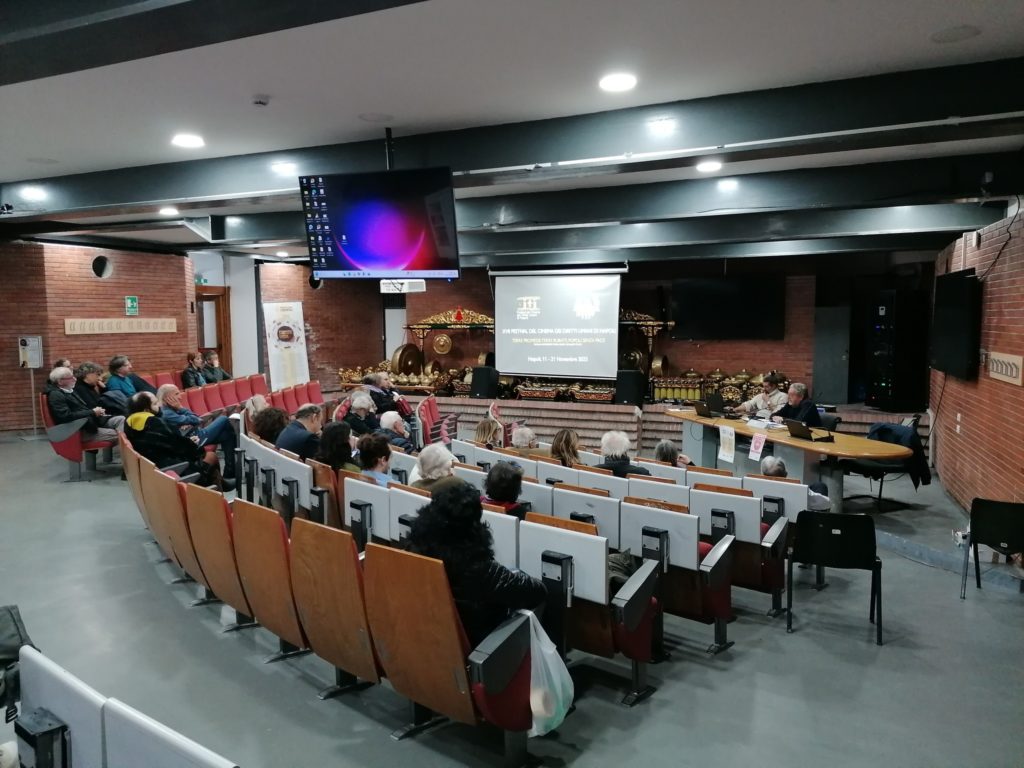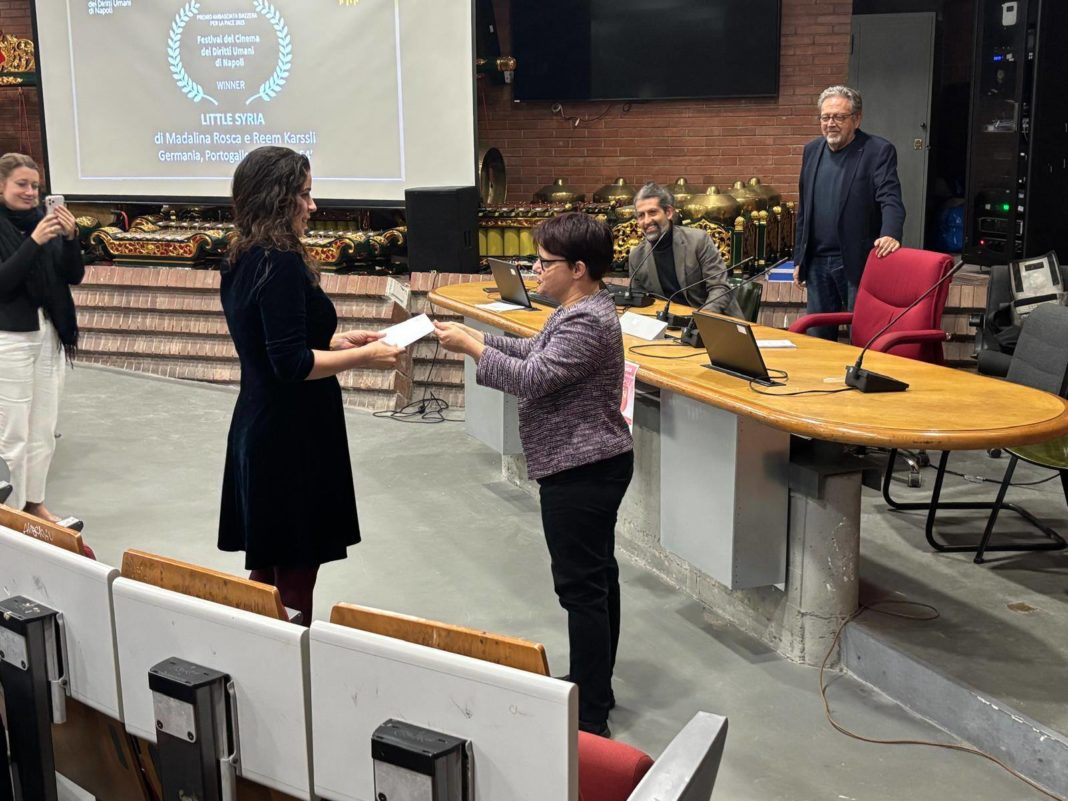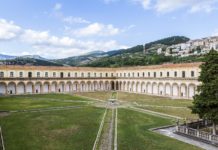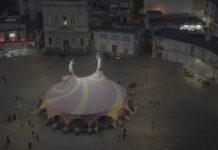“Little Syria”, di Madalina Rosca e Reem Karssli (Germania, Portogallo, Romania, 80’). Questo è il primo film premiato al Festival del cinema dei diritti umani di Napoli. La storia di tre rifugiati siriani in Europa, in fuga dopo la rivoluzione, si aggiudica, infatti, il “premio per la pace” che da cinque anni l’ambasciata svizzera in Italia assegna durante la manifestazione partenopea.
Reem Karssli, presente nell’aula delle mura greche di Palazzo Corigliano, sede dell’Università L’Orientale, ha ricevuto il premio dalle mani di Anna Russo Mattei, vicecapo missione, alla guida della delegazione che comprendeva Barbara Wachter e la Console a Napoli Raffaella D’Errico (foto della premiazione e del festival).
Intanto, la manifestazione, che quest’anno ha scelto il tema “Terre promesse, terre rubate. Popoli senza pace”, prosegue verso nuovi obiettivi. Dopo le tre mattinate dedicate alle scuole (lunedi 17 e martedi 18) e all’Università L’Orientale (mercoledi 19), continuano, fino al 20 novembre, le proiezioni dei film in gara a Palazzo Corigliano (ogni sera, dalle 19:00, fatta eccezione per domenica 16 novembre).
C’è attesa per i successivi eventi internazionali in programma, tutti a Piazza Forcella dalle ore 18.00, nei giorni 17, 18, 19 e 20)) che metteranno al centro le storie di tre popoli perseguitati (Sahrawi, Curdi e Palestinesi) che “resistono ai loro oppressori e dimostrano di saper vivere in promiscuità e in condizioni anche estreme” e che accompagneranno gli spettatori alla serata finale del 21 novembre a Piazza Forcella, quando assisteremo alle premiazioni per le altre categorie in gara (Human Rights Doc, Human Rights Short, Human Rights Youth, Premio Mario Paciolla), alle Menzioni (Arrigoni/mer Khamis e Giuria Diffusa) con l’omaggio musicale “… nostro mare è il mondo intero” di Alessio Lega.
Lunedì 17 novembre è la giornata dedicata al popolo Sahrawi. Alle 10, al cinema Vittoria sito nel quartiere Arenella, si terrà l’incontro “Un popolo in esilio”, con Fatima Mahfud, rappresentante del Fronte Polisario in Italia, Mohammed Dihani, ex prigioniero politico, il fotografo Patrizio Esposito e il regista Mario Fusco Martone. Sarà proiettato il film Una storia Sahrawi di Mario Martone, girato nel 1996 nei campi profughi del Tindouf.
Nel pomeriggio (ore 18.00, Piazza Forcella), l’incontro “Sahrawi, vedere l’occupazione” proporrà un confronto sulla situazione del Sahara Occidentale, ancora sotto controllo coloniale marocchino, con interventi di registi e attivisti impegnati nei territori occupati.
Martedì 18 novembre è la prima delle due giornate (anche mercoledì) dedicate al popolo curdo. La mattina (alle10, cinema Vittoria) previsto il panel “Il popolo delle montagne”, con il regista Veysi Altay, l’attivista Alfonso Di Vito e il ricercatore Alessandro Tinti. Proiezione de “La memoria di Sur” di Azad Altay (TUR, 2025, 36 min). Alle 18, a Piazza Forcella, “Il genocidio curdo” ripercorrerà gli esiti del processo aperto dal Tribunale Permanente dei Popoli che ha riconosciuto la straordinaria aggressione subito dal popolo Curdo. Proiezione ancora di “La memoria di Sur” di Azad Altay (TUR, 2025, 36 min).
Giovedì 20 novembre, tocca alla questione palestinese. L’appuntamento delle 18 a Piazza Forcella con Luisa Morgantini, Francesca Albanese (Relatrice Onu per i Diritti Umani nei Territori Palestinesi, in collegamento), Luigi de Magistris (già Sindaco di Napoli) e Luigi Daniele, giurista dell’Univ. del Molise.
L’incontro, dal titolo “La crisi dell’ordine mondiale e il futuro della Palestina”, offrirà una riflessione ampia sul nuovo assetto geopolitico del Medio Oriente e sulle conseguenze umanitarie del conflitto a Gaza e in Cisgiordania. Il monologo di Nino Racco, cantastorie calabrese, “Una Storia palestinese” chiuderà la serata proponendo una storia di amicizia israelo-palestinese tra due giovani.
Il Festival del cinema dei diritti Umani di Napoli è promosso dall’associazione cinema e diritti, con il contributo di Regione Campania, Film Commission Regione Campania, Comune di Napoli, Università L’Orientale, e il patrocinio della Confederazione elvetica e dell’ambasciata di Svizzera in Italia.
Per saperne di più
Learn more
https://www.cinenapolidiritti.it/web/

Naples Human Rights Film Festival/ Swiss Embassy awards peace prize to ‘Little Syria’. The story of three refugees fleeing after the revolution
Little Syria, by Madalina Rosca and Reem Karssli (Germany, Portugal, Romania, 80 min). This is the first film to win an award at the Naples Human Rights Film Festival. The story of three Syrian refugees in Europe, fleeing after the revolution, won the ‘peace prize’ that the Swiss Embassy in Italy has been awarding for five years during the Neapolitan event.
Reem Karssli, present in the Greek-style hall of Palazzo Corigliano, home of the L’Orientale University, received the award from Anna Russo Mattei, deputy head of mission, who led the delegation that included Barbara Wachter and the Consul in Naples, Raffaella D’Errico (photo of the award ceremony). Meanwhile, the event, which this year chose the theme “Promised lands, stolen lands. Peoples without peace”, continues towards new goals. After three mornings dedicated to schools (Monday the 17th and Tuesday the 18th) and L’Orientale University (Wednesday the 19th), screenings of the films in competition will continue at Palazzo Corigliano until the 20th November (every evening from 7 p.m., except Sunday yhe 16th November).
Meanwhile, the event, which this year has chosen the theme “Promised lands, stolen lands. Peoples without peace”, continues towards new goals. After three mornings dedicated to schools (Monday the 17th and Tuesday the 18th) and L’Orientale University (Wednesday the 19th), screenings of the films in competition will continue at Palazzo Corigliano until 20th November (every evening from 7 p.m., except Sunday 16th November).
There is anticipation for the upcoming international events, all at Piazza Forcella from 6 p.m. on the 17th, 18th, 19th and 20th, which will focus on the stories of three persecuted peoples (Sahrawis, Kurds and Palestinians) who “resist their oppressors and demonstrate their ability to live in promiscuity and even extreme conditions”.
These events will accompany the viewers to the final evening on the 21st of November in Piazza Forcella, when we will witness the awards ceremony for the other categories in competition (Human Rights Doc, Human Rights Short, Human Rights Youth, Mario Paciolla Award), the Mentions (Arrigoni/mer Khamis and Diffused Jury) with the musical tribute ‘… nostro mare è il mondo intero’ (Our sea is the whole world) by Alessio Lega.
Monday, the 17th of November, is the day dedicated to the Sahrawi people. At 10 a.m., at the Vittoria cinema in the Arenella district, there will be a meeting entitled “A people in exile”, with Fatima Mahfud, representative of the Polisario Front in Italy, Mohammed Dihani, former political prisoner, photographer Patrizio Esposito and director Mario Fusco Martone. The film Una storia Sahrawi (A Sahrawi Story) by Mario Martone, shot in 1996 in the Tindouf refugee camps, will be screened.
In the afternoon (6 p.m., Piazza Forcella), the meeting “Sahrawi, vedere l’occupazione” (Sahrawi, seeing the occupation) will offer a discussion on the situation in Western Sahara, still under Moroccan colonial control, with contributions from filmmakers and activists working in the occupied territories.
Tuesday, the 18th November, is the first of two days (also Wednesday) dedicated to the Kurdish people. In the morning (at 10 a.m., Cinema Vittoria), there will be a panel discussion entitled “The People of the Mountains”, with director Veysi Altay, activist Alfonso Di Vito and researcher Alessandro Tinti. Screening of “The Memory of Sur” by Azad Altay (TUR, 2025, 36 min). At 6 p.m., in Piazza Forcella, “The Kurdish Genocide” will retrace the outcome of the trial opened by the Permanent Peoples’ Tribunal, which recognised the extraordinary aggression suffered by the Kurdish people. Screening of “The Memory of Sur” by Azad Altay (TUR, 2025, 36 min).
Thursday the 20th of November will focus on the Palestinian question. The event will take place at 6 p.m. in Piazza Forcella with Luisa Morgantini, Francesca Albanese (UN Rapporteur for Human Rights in the Palestinian Territories, via video link), Luigi de Magistris (former Mayor of Naples) and Luigi Daniele, jurist at the University of Molise.
The meeting, entitled “The crisis of world order and the future of Palestine”, will offer a broad reflection on the new geopolitical order in the Middle East and the humanitarian consequences of the conflict in Gaza and the West Bank. The monologue by Nino Racco, a Calabrian storyteller, “Una Storia palestinese” (A Palestinian Story) will close the evening with a story of Israeli-Palestinian friendship between two young people.
The Naples Human Rights Film Festival is promoted by the Cinema and Rights Association, with the contribution of the Campania Region, the Campania Region Film Commission, the Municipality of Naples, L’Orientale University, and the patronage of the Swiss Confederation and the Swiss Embassy in Italy.










